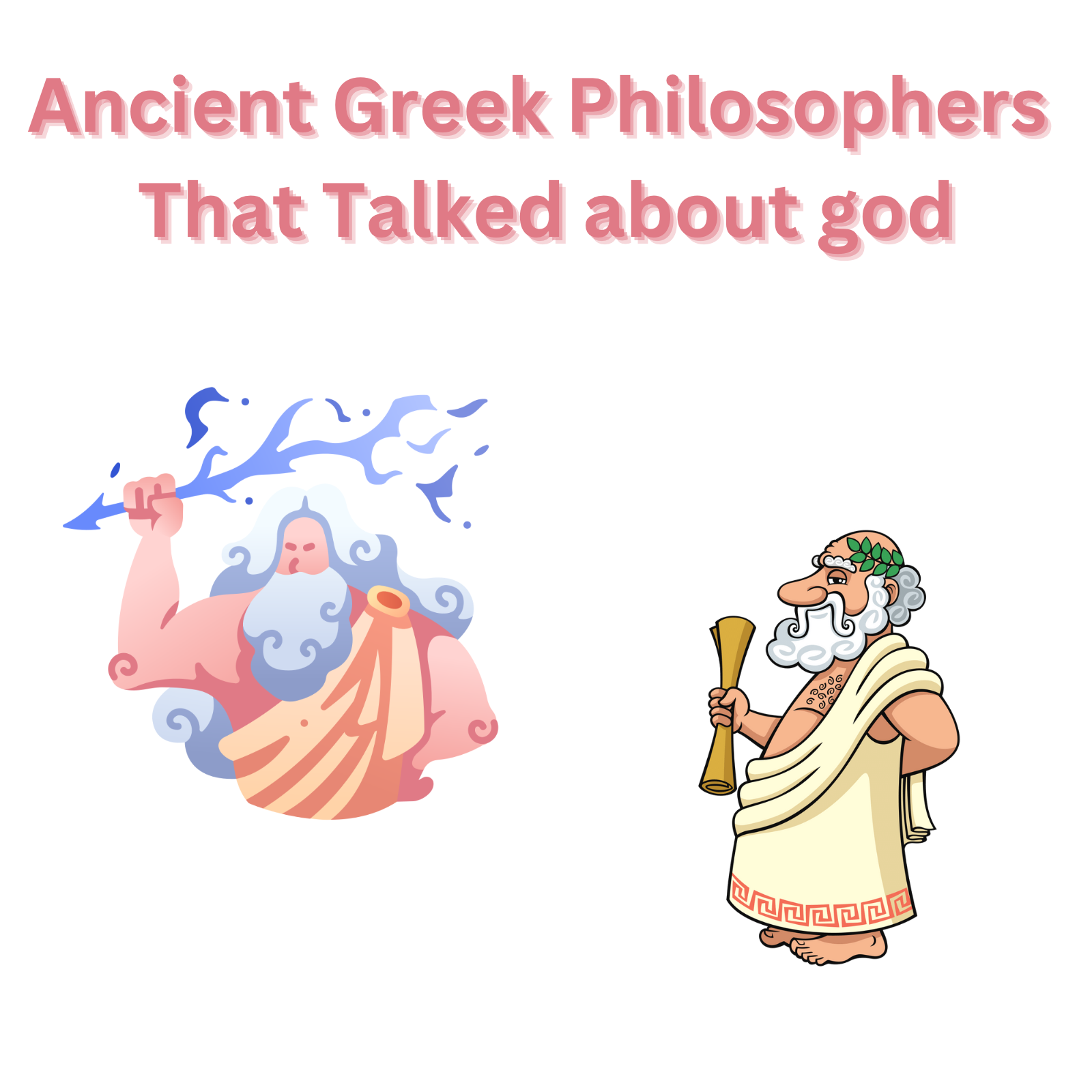
8 Ancient Greek Philosophers That Talked about god
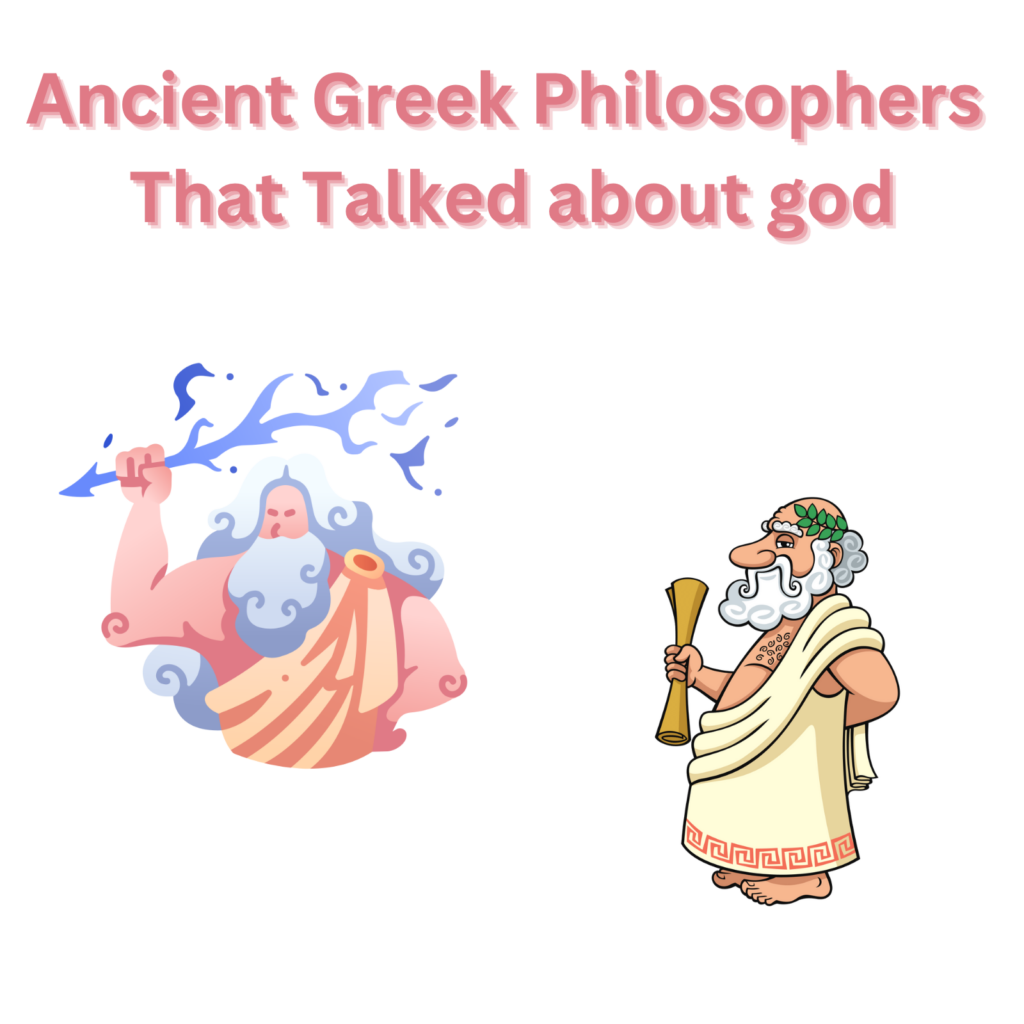
8 Ancient Greek Philosophers That Talked about god
Below I will try to go over 8 Ancient Greek Philosophers That Talked about god. In my attempt to interpret philosophy books over the years I gathered a list of quotes where I could from each philosopher and what they said regarding god. Each person has a different interpretation my goal here is not to try to explain that, rather than just present you with the facts from their sayings.
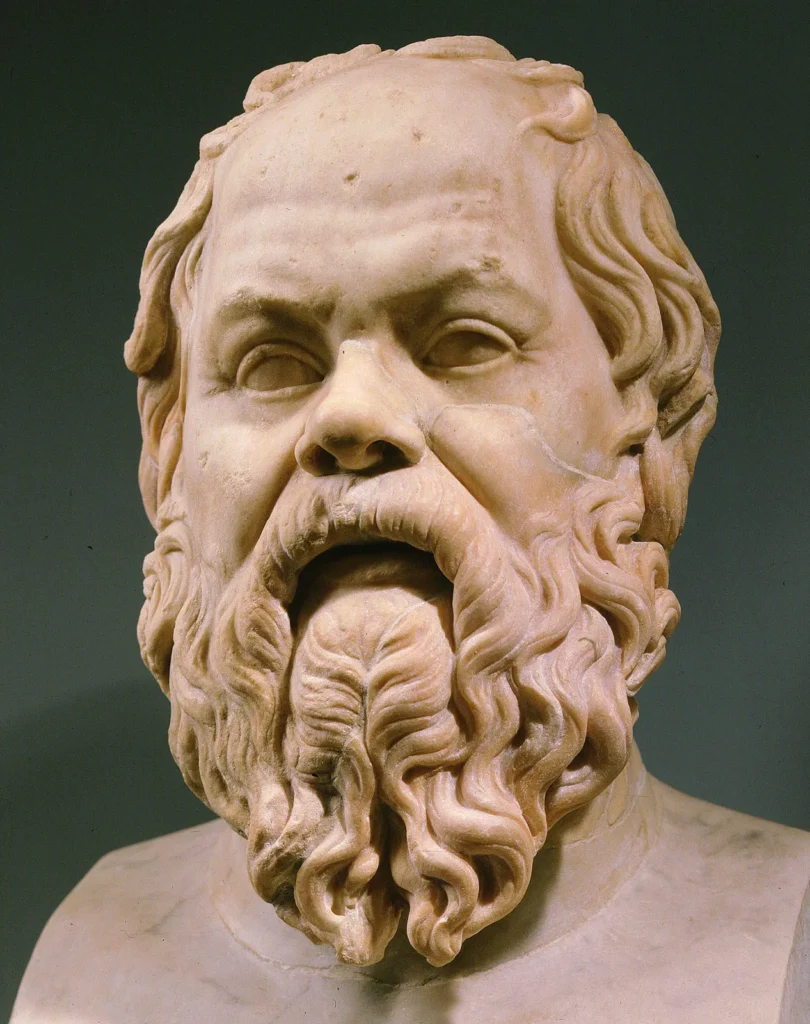
Socrates
1. Socrates (469/470 BCE – 399 BCE) was a classical Greek philosopher who is credited as one of the founders of Western philosophy. Socrates was known for his method of questioning, known as the Socratic method, which was used to challenge and examine the beliefs of others. While Socrates did not leave any written works of his own, his beliefs about God can be inferred from the dialogues of Plato, his student. In the dialogues, Socrates is depicted as believing in a divine being or deities, but he did not believe in the traditional Greek pantheon of gods.Here are some quotes from Socrates on god:
- “We come to understand the world and ourselves.”
- “Through living in accordance with the divine that we can achieve happiness and fulfillment.”
- “Through the divine that we can understand the natural laws that govern the world.”
- “We can understand the ultimate nature of things.”
Socrates’ beliefs about the divine were influenced by the Pythagorean tradition, which held that the universe was governed by mathematical principles and that these principles could be apprehended by the human mind through contemplation and reason. Socrates also believed that living in accordance with the divine was the key to achieving happiness and fulfillment in life.
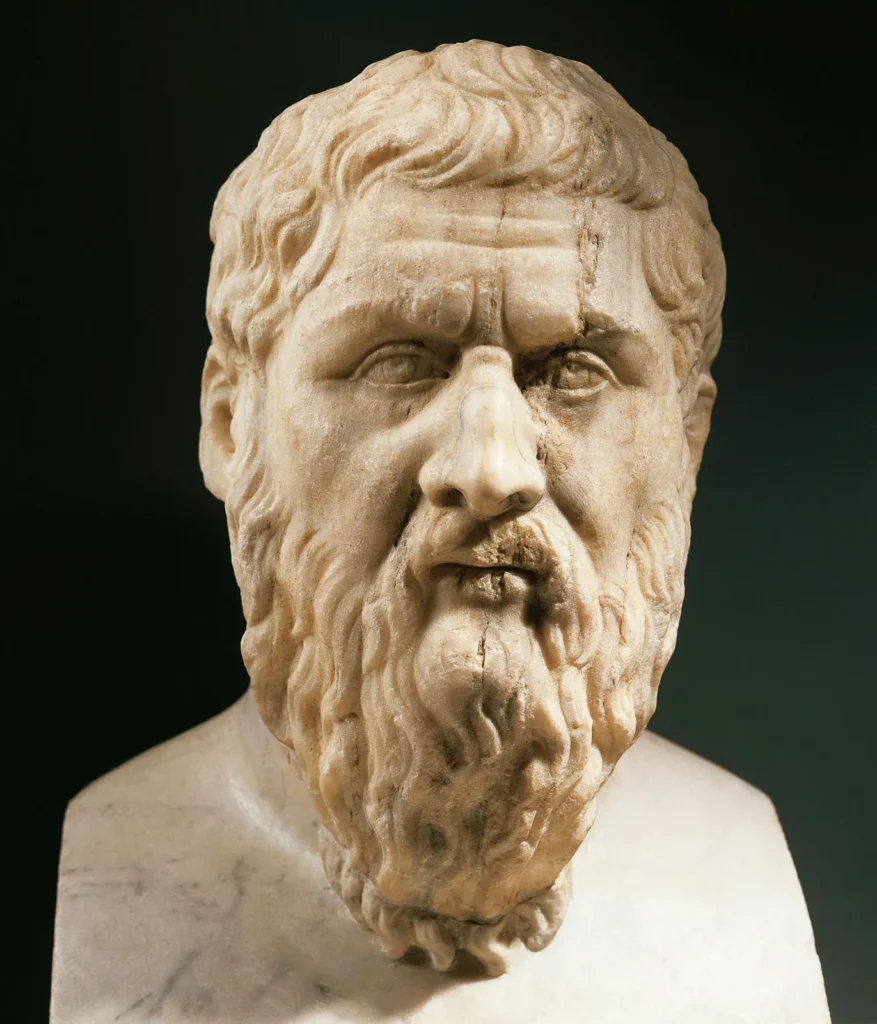
Plato
2. Plato (427 BCE – 347 BCE) was a student of Socrates and one of the most influential philosophers in the Western tradition. Plato believed in the existence of a perfect, eternal, and immutable reality, which he called the Form of the Good or the Idea of the Good. Plato believed that this reality was the source of all knowledge and that it could be apprehended by the human mind through contemplation and reason. Plato also believed in the existence of a divine being or deity, which he referred to as the Demiurge or the Creator.Here are some quotes from Plato on the the unexplained entity:
- “The ultimate cause of all things.”
- “Goodness, beauty, and truth, the ultimate standard by which we should measure all things.”
- “The ultimate goal towards which we should strive.”
- “The guiding force behind all natural processes.”
Plato’s god idea was influenced by the philosophy of his mentor, Socrates, who believed in the existence of a divine being or deities. Plato’s philosophy of the divine was also influenced by the Pythagorean tradition, which held that the universe was governed by mathematical principles and that these principles could be apprehended by the human mind through contemplation and reason.
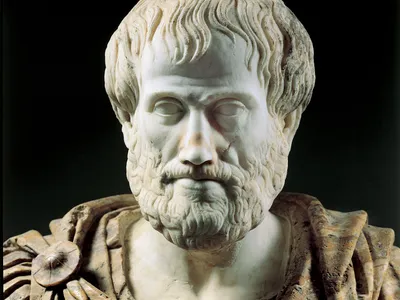
Aristotle
3. Aristotle (384 BCE – 322 BCE) was a student of Plato and one of the most influential philosophers in the Western tradition. Aristotle believed in the existence of a supreme being or deity, which he referred to as the Unmoved Mover or the Prime Mover. Aristotle believed that this deity was the cause of all motion and change in the universe, and that it was the ultimate goal or end towards which all things strive.Here are some quotes from Aristotle on the concept of god:
- “The unmoved mover that sets everything in motion.”
- “The ultimate reality that underlies all other forms of reality.”
- “Strive in our pursuit of understanding.”
- “Through living in accordance with the divine that we can achieve happiness and fulfillment.”
Aristotle’s thoughts on god was influenced by the philosophy of his mentor, Plato, who believed in the existence of a perfect, eternal, and immutable reality. Aristotle’s philosophy of the divine was also influenced by the Pythagorean tradition, which held that the universe was governed by mathematical principles and that these principles could be apprehended by the human mind through contemplation and reason.
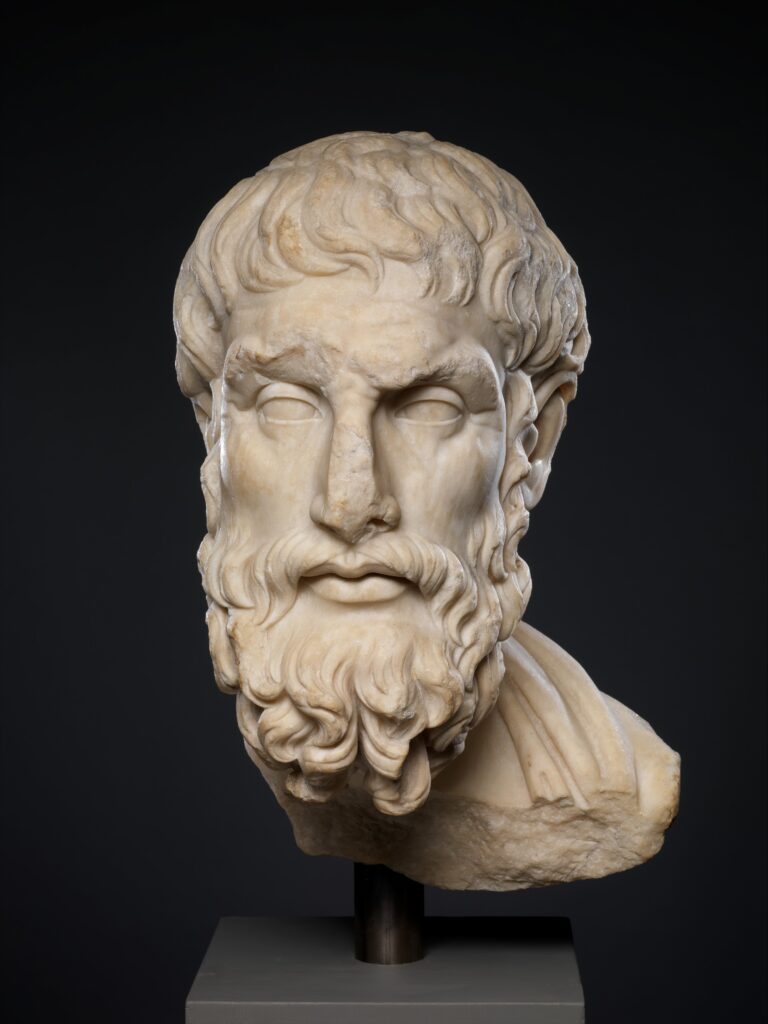
Epicurus
4. Epicurus (341 BCE – 270 BCE) was a Greek philosopher who founded the philosophical school of Epicureanism. Epicurus believed in the existence of multiple deities, but he did not believe that they were involved in the affairs of humans or that they had any influence on the natural world. Epicurus believed that the gods were perfect and eternal beings who lived in a state of perpetual happiness and pleasure, and that they were not concerned with human affairs.
5. Zeno of Citium (334 BCE – 262 BCE) was a Greek philosopher who founded the Stoic school of philosophy. Zeno believed in the existence of a divine being or deity, which he referred to as the Logos or the Reason. Zeno believed that this deity was the source of all order and rationality in the universe, and that it was responsible for the natural laws that govern the world. According to Zeno, the Logos was the source of all order and rationality in the universe, and it was responsible for the natural laws that govern the world.Here are some quotes from Zeno on the Logos (which basically means talking in Greek):
- “The Logos is the principle of all things, the fountain of all existence.”
- “The Logos is the mind of the universe, the source of all thought and understanding.”
- “The Logos is the cause of all motion and change in the world, the guiding force behind all natural processes.”
- “The Logos is the source of all virtue and wisdom, the ultimate goal towards which we should strive.”
Zeno’s concept of the Logos was influenced by the philosophy of Heraclitus, who believed that the universe was governed by a rational principle called the Logos. The Stoics, following Zeno, believed that the Logos was the source of all order and rationality in the world, and that it could be apprehended by the human mind through contemplation and reason. They believed that living in accordance with the Logos was the key to achieving happiness and fulfillment in life.
6. Chrysippus (279 BCE – 206 BCE) was a Greek philosopher who was a leading member of the Stoic school of philosophy. Chrysippus believed in the existence of a divine being or deity, which he referred to as the Logos or the Reason. Chrysippus believed that this deity was the source of all order and rationality in the universe, and that it was responsible for the natural laws that govern the world.
7. Plotinus (205 CE – 270 CE) was a Greek philosopher who was the founder of Neoplatonism, a philosophical movement that sought to combine the teachings of Plato with those of Aristotle. Plotinus believed in the existence of a supreme being or deity, which he referred to as the One or the Good. Plotinus believed that this deity was the source of all being and reality, and that it could be apprehended by the human mind through contemplation and spiritual union.
8. Proclus (412 CE – 485 CE) was a Greek philosopher who was a leading exponent of Neoplatonism. Proclus believed in the existence of a supreme being or deity, which he referred to as the One or the Good. Proclus believed that this deity was the source of all being and reality, and that it could be apprehended by the human mind through contemplation.Here are some quotes from Proclus on the concept of the divine. Proclus idea on god was influenced by the philosophy of his mentor, Plotinus, who was the founder of Neoplatonism. Proclus’ philosophy of the divine was also influenced by the Pythagorean tradition, which held that the universe was governed by mathematical principles and that these principles could be apprehended by the human mind through contemplation and reason.
Related:
References:
Archives
- March 2026
- February 2026
- January 2026
- December 2025
- November 2025
- October 2025
- September 2025
- August 2025
- July 2025
- June 2025
- May 2025
- April 2025
- March 2025
- February 2025
- January 2024
- October 2023
- September 2023
- August 2023
- July 2023
- June 2023
- May 2023
- April 2023
- March 2023
- February 2023
- January 2023
- December 2022
- November 2022
- October 2022
- September 2022
- August 2022
- June 2022
- May 2022
- April 2022
- March 2022
- January 2022
- December 2021
- November 2021
- October 2021
- August 2021
- November 2020
- July 2020
- May 2020
- April 2020
- March 2020
- August 2018
- July 2018
- June 2018
- April 2018
- March 2018
Categories
- Aftercare Procedures
- Age Groups
- AI/ML
- Alternative Medicine
- Ambient Computing
- Animal Health
- Animal Husbandry
- Animals
- Anti-Aging
- Architectural Design
- Art And Technology
- Auditory Science
- Augmented Reality
- Automation
- Babies
- Baby
- Beauty & Skincare
- Beauty Industry
- Biohacking
- Biomechanics
- Book Reviews
- Breastfeeding
- Budgeting
- Budgeting Strategies
- Business
- Cardiovascular Health
- Career Advice
- Career Development
- Career Growth
- Cats
- Chess
- Chronobeauty
- Circular Economy
- Civic Technology
- Cleaning Tips
- Cloud Computing
- Cognitive Health
- Cognitive Performance
- Cognitive Science
- Community
- Community Building
- Community Engagement
- Community Living
- Computer Vision
- Consumer Guides
- Consumer Trends
- Container Gardening
- Content Analysis
- Content Non-Technical
- Content Strategy
- Cooking Techniques
- Cooking Tips
- Copyright Law
- Cosmetic Chemistry
- Cultural Events
- Cycling
- Data Analysis
- Data Engineering
- Data Governance
- Data Science
- Database
- Design Psychology
- Design Trends
- Developer Productivity
- Diet
- Diet
- Diet And Nutrition
- Digital Identity
- Digital Media
- Digital Wellbeing
- DIY
- DIY Projects
- Dogs
- Engineering Culture
- Entertainment News
- Environmental Impact
- Environmental Science
- Equity Compensation
- Ethical AI
- Exercise
- Exercise Science
- Exercise Technique
- Exotic Pets
- Fall Gardening
- Family
- Family Health
- Family Life
- Fashion Business
- Fashion Industry
- Fashion News
- Fashion Tech
- Financial Analysis
- Financial Optimization
- Financial Planning
- Flooring Maintenance
- Food
- Food Psychology
- Food Safety
- Food Science
- Food Tech
- Functional Fitness
- Functional Training
- Future Of Work
- Garden Care
- Garden Maintenance
- Gardening Tips
- Generative AI
- Geospatial Data
- Gig Economy
- Greece
- Greek
- Greek Food
- Green Technology
- Gymnastics
- Hardware Engineering
- Health
- Health And Wellness
- Health Informatics
- Health Science
- Health Tech
- Health Technology
- Healthcare
- Healthcare Management
- Healthy Eating
- Healthy Recipes
- Holistic Health
- Holistic Wellness
- Home & Living
- Home Decor
- Home Financing
- Home Health
- Home Improvement
- Home Maintenance
- Home Organization
- Home Styling
- Horticulture
- Household Chemistry
- Identity Management
- Indian Cuisine
- Indoor Gardening
- Industrial Design
- Industry Analysis
- Infant Nutrition
- Infrastructure Management
- Ingredient Deep Dive
- Integrative Health
- Integrative Medicine
- Interior Design
- Internet of Things
- Internet of Things (IoT)
- Invalid Request
- Investment Strategies
- Investment Strategy
- IoT
- Kids
- Leadership Development
- Learning Strategies
- Lifestyle
- Lifestyle Brands
- Lifestyle News
- Lifestyle Optimization
- Literary Criticism
- Literature
- Logistics Management
- Machine Learning
- Material Science
- Materials Science
- Meal Planning
- Media Analysis
- Meditation
- Mental Health
- Mental Performance
- Mental Wellness
- Miami
- Miami Food
- Mind And Body
- Minimalism
- Mobile Development
- Neuroscience
- No Applicable Categories
- Nursing
- Nutrition
- Nutrition News
- Open Source
- Operating Systems
- Operational Resilience
- Opinion
- Organization Tips
- Outdoor Living
- Over 40
- Over 50
- Over 60
- Parenting
- Parenting
- Parenting Strategies
- Performance
- Performance Optimization
- Personal Development
- Personal Finance
- Personal Growth
- Personal Productivity
- Pet Care
- Pet Safety
- Philosophy
- Plant Care
- Politics
- Product Formulation
- Productivity
- Productivity Engineering
- Protein
- Psychology
- Psychology of Space
- Quantified Self
- Reading Culture
- Real Estate Investment
- Recipe Development
- Recipes
- Regulatory Compliance
- Remote Work
- Renovation Planning
- Resource Management
- Respiratory Health
- Responsible Pet Ownership
- Retail Strategy
- Retail Technology
- Robotics
- Science
- Seafood
- Seasonal Gardening
- Security
- Sedentary Health
- Self-Care
- Skincare Science
- Skincare Trends
- Sleep
- Sleep Health
- Smart Home
- Smoothies
- Social Impact
- Soft Skills
- Soil Health
- Spatial Computing
- Spatial Design
- Stress Management
- Supplements
- Sustainability
- Sustainability Science
- Sustainable Engineering
- Sustainable Fashion
- Systems Engineering
- Tax Optimization
- Tax Strategy
- Tech Investment
- Technical Writing
- Technology Law
- Testing
- Travel
- Travel News
- Travel Safety
- Travel Tips
- Trend Analysis
- Tropical Plants
- Uncategorized
- Urban Gardening
- Urban Planning
- User Experience
- Veggie
- Vietnam
- Virtual Events
- Volunteering
- Wealth Management
- Wearable Technology
- Web Development
- Wellness
- Wellness Technology
- Winter Gardening
- Work-Life Balance
- Workplace Culture
- Workspace Setup
- World
- Writing
- Writing Skills
- Year In Review
- Yoga
- Yoga News
- Zero Waste

Leave a Reply